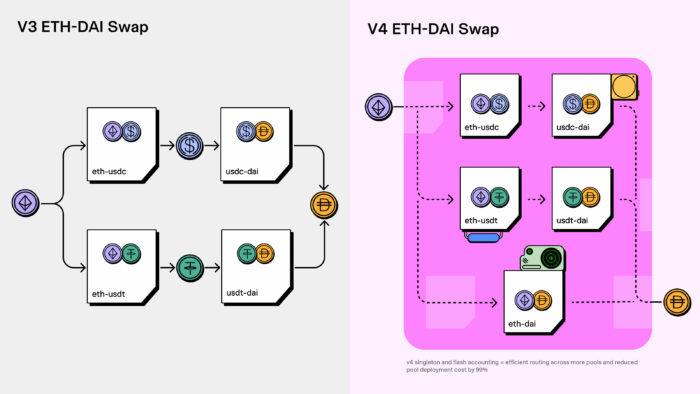The alpha:
- Uniswap Labs has released the draft code for Uniswap v4, featuring unique plugins and custom liquidity pools.
- V4 marks the first time Uniswap Labs has opened up to community feedback prior to a public release, demonstrating its commitment to a decentralized development model.
- While no official launch date for v4 has been announced, the team plans to engage in extensive community interaction and review the base code.
Dive deeper
Uniswap Labs, the pioneering team behind the world’s leading decentralized exchange (DEX), has announced plans for the next major upgrade: Uniswap v4. The June 13 announcement came with the release of the upgrade draft code and marks a new approach to creating a more inclusive and decentralized development model.
Given that the Uniswap protocol has not received a significant update since v3 was deployed to the Ethereum mainnet in May 2021, this latest news feels like a signal of massive growth from Uniswap Labs – which has been steadily evolving despite the ever-changing crypto and NFT market.
Known for popularizing automated market makers (AMMs), Uniswap is a major player in the crypto trading landscape, with cumulative transaction volume exceeding $1 trillion with its current version, according to DefiLlama. However, the upcoming iteration aims to surpass this impressive legacy by improving coin exchange functionalities and introducing custom liquidity pools.
Notably, Uniswap v4 introduces a unique feature called “hooks”, an innovative new concept that includes smart contracts that can be plugged into different pools. The feature paves the way for a range of customizable options such as on-chain limit orders and dynamic fees — which anecdotally have been difficult to integrate in a blockchain environment without centralized order books or intermediaries — to be introduced on the platform.
“Hooks are contracts that run at different points in the lifecycle of a pool action. Pools can make the same tradeoffs as v3, or they can add completely new functionality,” said Uniswap CEO and Founder Hayden Adams said in a blog post. “For example, V4 will allow pools that natively support dynamic fees, add on-chain limit orders, or act as a time-weighted average market maker (TWAMM) to spread large orders over time.”

The ability of hooks to facilitate the creation of TWAMMs could be of great importance with this latest update, as it potentially mitigates risks associated with unfavorable price movements. Essentially, TWAMMs mean that v4 users can perform long-term swaps where, rather than immediately transferring a token based on current price metrics, currencies can be converted over a long period of time.
In addition, Adams’ blog post states that Uniswap v4 offers an “improved architecture and gas savings”, potentially solving a longstanding challenge for traders – high gas costs. With the advent of a “singleton contract,” the new architecture ensures that all pools are contained within a single smart contract, significantly reducing the gas cost of creating a pool, expected to be up to 99 percent. This method of “flash accounting” means that only net balances are transferred in and out of pools, further minimizing costs.
A commitment to collaboration
Uniswap Labs reflects its commitment to driving community-based development and breaks new ground by releasing the draft code for v4 to encourage public feedback. Adams noted that the open-source nature of the code would allow for meaningful community contribution in refining the final product.
The move to a more participatory model comes at a time of uncertainty in crypto regulation as Binance and Coinbase endure legal disputes with the US Securities and Exchange Commission (SEC). But perhaps the ongoing SEC situation only further reinforces Web3’s need for the decentralization ethos that Uniswap is trying to embody.
Uniswap v4 is currently in its early stages and the final launch date has not yet been determined. However, the platform’s progressive approach points to a promising future with the potential to redefine the standards for decentralized exchanges.
In case you missed it:
Editor’s Note: This article was written by an nft now contributor in collaboration with OpenAI’s GPT-4.

